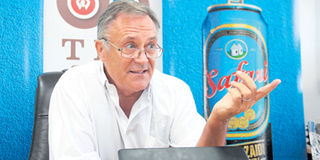TBL for solar project to cut electricity spending

TBL Group technical director Gavin Van Wijk speaks in Dar es Salaam yesterday. PHOTO|THE CITIZEN CORRESPONDENT
What you need to know:
- The TBL Group technical director Gavin Van Wijk said in Dar es Salaam yesterday that the first phase of its solar project at its Mbeya Plant, which was commissioned a few days ago, would enable the company to reduce carbon emission by 130 tonnes per annum.
Dar es Salaam. Tanzania Breweries Limited (TBL) Group has injected $250,000 (about Sh545 million) into its newly-commissioned solar project in Mbeya Region as the beer brewer seeks to play an increasingly significant role in conserving the environment and reducing its spending on electricity.
The TBL Group technical director Gavin Van Wijk said in Dar es Salaam yesterday that the first phase of its solar project at its Mbeya Plant, which was commissioned a few days ago, would enable the company to reduce carbon emission by 130 tonnes per annum.
“This project has several benefits. For instance, the first phase of our Mbeya Plant Solar programme will cut carbon emission by 130 tonnes per year,” he said yesterday, noting that the volume was equivalent to six per cent of the beer maker’s carbon emission at the Mbeya Plant.
South Africa based Romanov Company has installed the 268,000 KiloWatt Hours per year system at TBL’s Mbeya Plant, helping the company to save $20,000 (about Sh44 million) from its annual electricity payments.
The payback period for the project, according to Mr VanWijk, is five years and the system’s lifespan is 15 years.
“This means that in five years, we will have recouped the money that has been injected into the project and have 10 more years of utilising the system before it expires,” he said, noting, however, that the most important aspect of the project was its emission cutting nature.
With the project, all refrigeration plants facilities at TBL’s Mbeya Plant are now run on solar energy.
Nevertheless, TBL Group is still investigating other solar technologies that could have a lower payback time as it ponders over embarking on the second phase of the project at its Mbeya Plant as well as rolling out a similar project to its Mwanza, Arusha and Dar es Salaam plants.
“For the Mbeya Plant,” said Mr Wijk, “the second phase of the project will include production of electricity to power air compressors, water boilers and other utilities, while the third phase will specifically target the brewing and packaging segments.”
He said he wished he could complete the whole project in five years, but it would depend on the availability of funds and the new technologies that might have better payback period,” he said.




